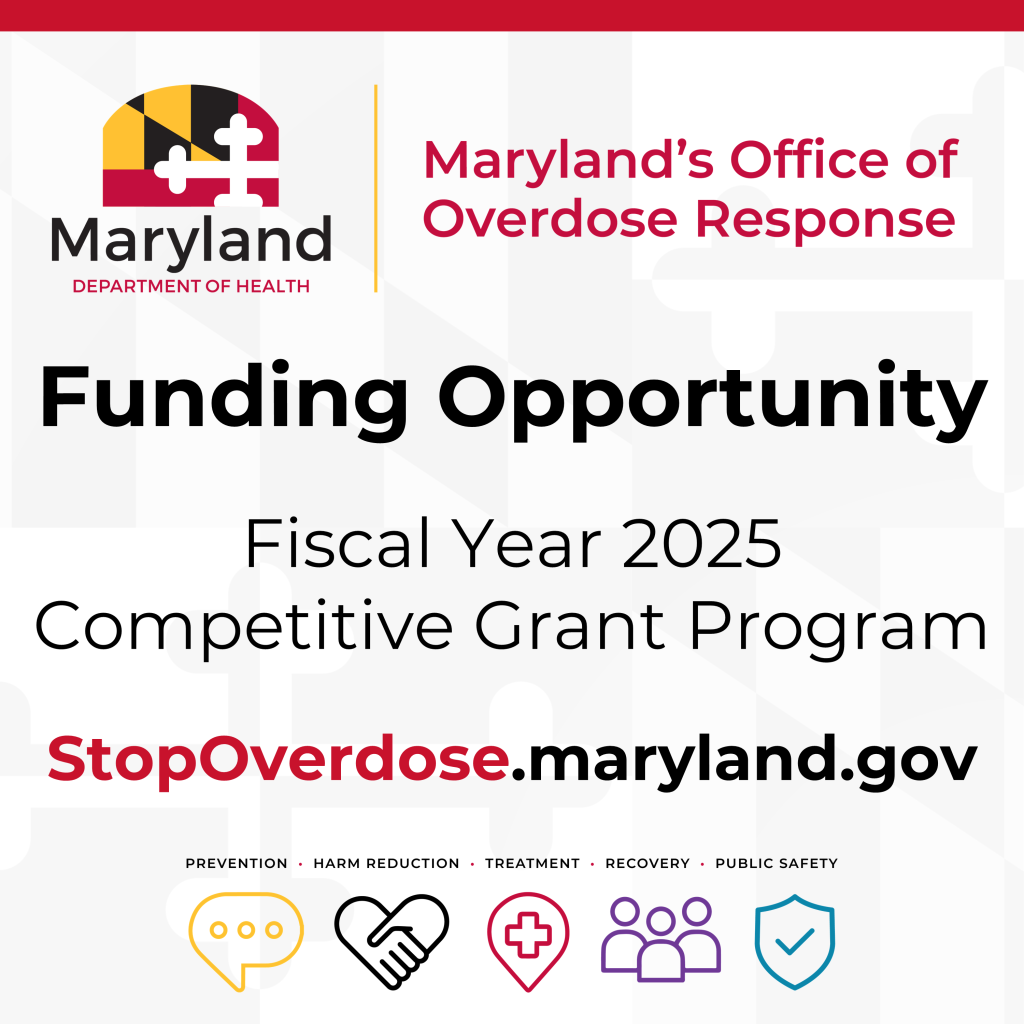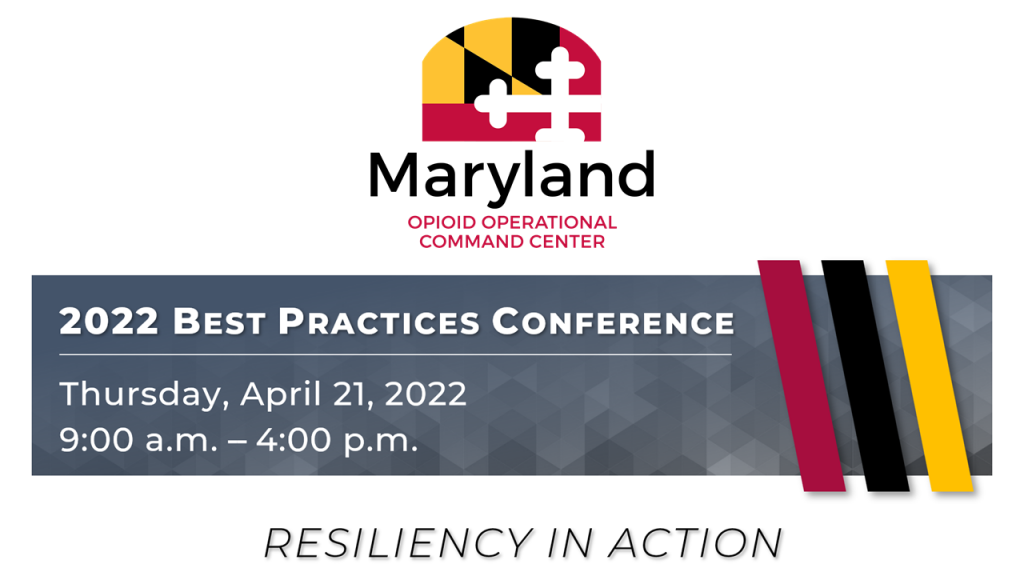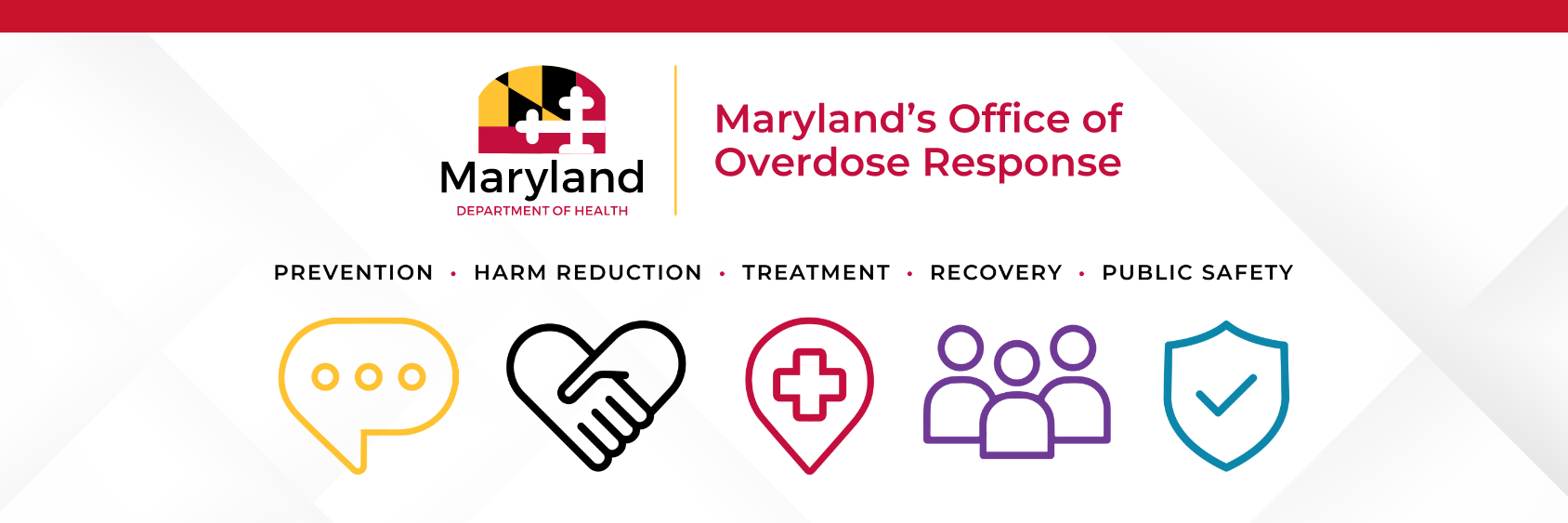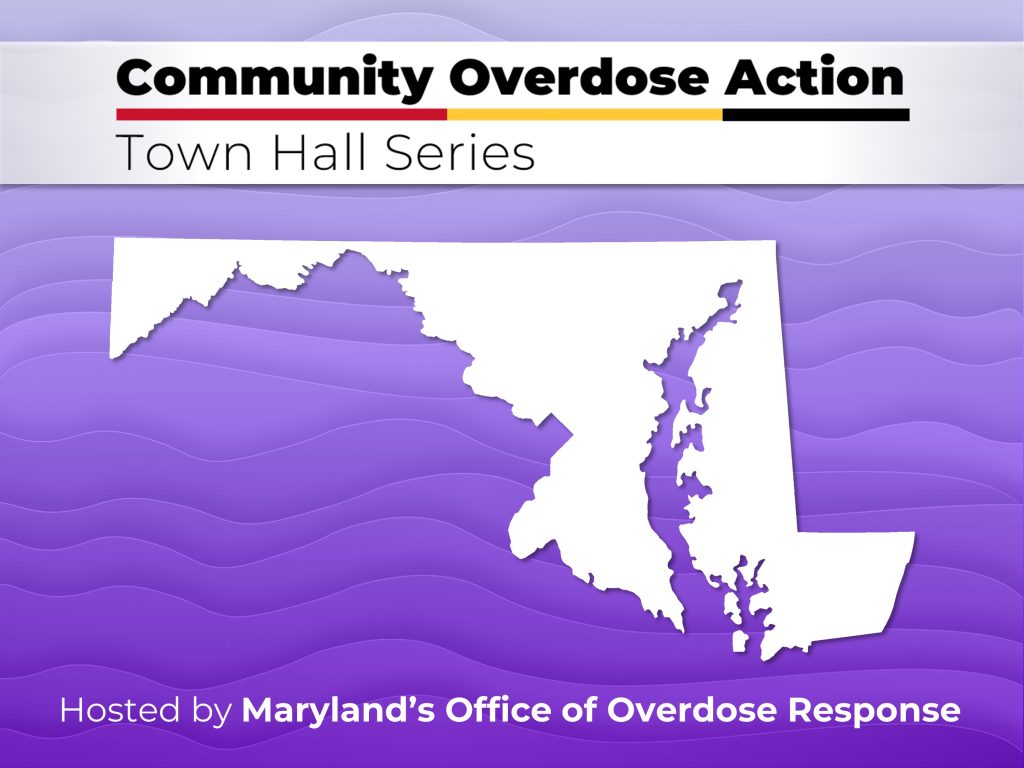Events Archive
2024

Information Session: FY2025 Competitive Grant Program
Friday, February 9, 2024 (virtual)
This information session was held on Friday, February 9, 2024 to provide an overview of the application process and requirements for our fiscal year 2025 Competitive Grant Program. For more details regarding this program and how to apply, visit StopOverdose.maryland.gov/grants.
Meeting Recording | Meeting Materials
2023
Community Overdose Action Town Hall Series
Maryland’s Office of Overdose Response visited each of Maryland’s 24 local jurisdictions to hear directly from community members about how we can do more to address the overdose crisis.
You can see a full list of upcoming town halls and summaries of previous events here: StopOverdose.maryland.gov/town-halls.
Webinar: Overdose Fatalities in Maryland Jurisdictions and Implementation of Prevention Strategies
Tuesday, August 30, 2022
This session featured a presentation from Catherine Tomko, Ph.D., a postdoctoral fellow with the Johns Hopkins Bloomberg School of Public Health, regarding the results of a recent evaluation of the 143 local-level overdose prevention programs in our Substance Use Disorder Program Inventory.
2022

On Thursday, April 21, 2022, the OOCC held our third annual Substance Use Disorder Best Practices Conference.
This event featured leading voices from the fields of Prevention & Education, Treatment & Recovery, and Enforcement & Public Safety. Breakout session topics included recovery services and peer programs, family support services, addressing stigma, using data to inform prevention programming, treating justice-involved individuals, harm reduction, and more.
You can view a recording of the conference here: https://beforeitstoolate-bpc2022.conventus.live/
Maryland SOS Regional Town Hall Series

In 2021-2022, the OOCC hosted 11 listening sessions across Maryland through our Maryland Stop Overdose Strategy (Maryland SOS) Regional Town Hall Series, which we launched in response to the increase in overdose deaths observed during the coronavirus pandemic. The town halls were intended to provide community members a platform to share their experiences about how the opioid crisis has impacted their lives and to share ideas for how we can do more to help people with substance use disorders.
The OOCC received a tremendous amount of passionate and insightful feedback through our town halls, and we would like to offer our sincerest gratitude to everyone who participated.
Click here for a full list of upcoming and past events.
OUD Examination and Treatment Act Grant Program Grant Writing Workshop
February 24, 2022
Opioid Operational Command Center hosted this virtual workshop on February 24th 2022 to review the requirements of our new grant program, which is designed to help local jurisdictions implement the Opioid Use Disorder Examination and Treatment Act (ETA) of 2019. The ETA Grant Program will help applicants increase the availability of treatment and other services for opioid use disorder in county detention centers. For additional information and details on how to apply to the ETA Grant Program, visit: https://beforeitstoolate.maryland.gov/grant-opportunities/.
Please email help.oocc@maryland.gov for more information.
2021
2021 Statewide ROSC Summit
Friday, September 24, 2021
Maryland’s 1st Recovery Oriented Systems of Care (ROSC) Annual Summit co-hosted by CB Connects and the Opioid Operational Command Center. This virtual event featured presentations from Robin Rickard, executive director of the Opioid Operational Command Center, Dr. Aliya Jones with the Behavioral Health Administration, Dr. David Best with the University of Derby, Dr. Haner Hernandez with the Harvard Center for Health and Human Rights, Jessica Hulsey with Addiction Policy Forum, and Dr. Jean Bennett, Region 3 Administrator for the Substance Abuse and Mental Health Services Administration (SAMHSA).
Webinar: Introduction to the OOCC
Thursday, June 10, 2021
This webinar was held to provide information about our office and our work to coordinate Maryland’s response to the opioid crisis. Topics covered included the creation of the OOCC, our mission, our work coordinating with state and local partners, our reporting and data monitoring activities, and our grant programs. This session also focused on our work at the local level and will address our efforts to coordinate with opioid intervention teams and our block grant program for local jurisdictions.
Webinar: OOCC Grant Writing Fundamentals
Tuesday, April 6, 2021
On April 6, 2021, the OOCC conducted a virtual information session to assist eligible organizations that are interested in applying for OOCC Competitive Grant Program funding for fiscal year 2022. The session covered an overview of the Competitive Grant Program, address application requirements, and describe the evaluation process by the OOCC Grants Scoring Committee.
2021 Best Practices Conference
Tuesday, March 26, 2021
Our annual Substance Use Disorder Best Practices Conference was held on March 16, 2021. This year’s virtual conference covered a range of opioid-related topics organized around the Governor’s three policy priorities (Prevention & Education, Enforcement & Public Safety, and Treatment & Recovery). The conference was recorded and may be viewed at the link below.
Representatives from both the state and local level convened to discuss what’s working in Maryland to address the opioid and substance use disorder crisis. Session topics include: Keynote Remarks from Lt. Governor Boyd Rutherford, Addressing Racial Disparities in Substance Misuse, Modifying Programming during COVID-19, Harm Reduction Programming, The Sequential Intercept Model, and Adverse Childhood Experiences.
The theme of this conference was Meeting the Moment, Together. The conference focused on overcoming adversity during the COVID-19 pandemic.
Click Here to View the Conference
Opioid Use Disorder Examination and Treatment Act Learning Collaborative
Friday, February 19, 2021
On February 19, 2021, the OOCC, the Behavioral Health Administration of the Maryland Department of Health, and the Governor’s Office of Crime Prevention, Youth, and Victims Services hosted a collaborative session to share information regarding the Opioid Use Disorder Examination and Treatment Act of 2019. The session featured presentations regarding pilot programs in four Maryland counties identified in the legislation for expanding access to screening, counseling, and treatment services for individuals with opioid use disorder in local detention facilities. File Edit View Insert Format Tools Table Paragraph



 1-888-373-7888
1-888-373-7888 233733
233733